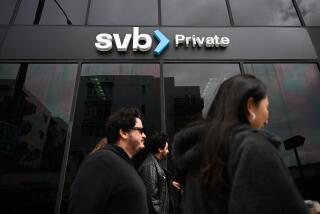Death watch for Downey Savings?
- Share via
Reeling from mortgage loan losses, Downey Financial Corp. warned last week that its choices were stark: Raise capital or risk a government takeover.
It’s still waiting for that capital. And since today is Friday, the day when bank takeovers generally occur, industry observers will be watching again to see whether Downey turns the keys to its executive suite over to the Federal Deposit Insurance Corp.
“My little circle of banking friends has talked about it each Friday for the past few weeks: Is this the day that Downey gets taken over?” said Joe Garrett, a Berkeley banking and mortgage consultant with 30 years in the business, half of them operating federally insured banks.
Downey executives didn’t respond to requests for comment.
The Newport Beach-based bank has said in the past that it is trying to comply with orders from the federal Office of Thrift Supervision to reduce soured loans, dispose of foreclosed properties, strengthen management and provide an updated business plan that no longer relies on revenue from risky mortgage loans.
In its Nov. 10 filing with the Securities and Exchange Commission, however, Downey Financial said there was “substantial doubt” that it and subsidiary Downey Savings could “continue as going concerns.”
In the event of a government takeover, individual depositors are insured by the FDIC for up to $250,000.
As part of its $700-billion bailout of financial companies, the government has been buying stakes in healthy banks, hoping the fresh capital will allow them to resume lending and stimulate the economy. But industry experts say there is little hope Downey is strong enough to win a federal investment, and the savings and loan has said there is “no assurance” it could tap federal funds.
Investors appear to be betting that the bank won’t survive. The shares have lost 99% of their value this year, falling 2 cents Thursday to 19 cents. A year ago, they traded over $40.
With most economists saying the nation is in recession, Downey is far from the only lender in the region to be beaten up on Wall Street.
The Inland Empire’s PFF Bancorp, Vineyard National Bancorp and Temecula Valley Bancorp, for example, have seen their stocks punished especially hard by investors worried that their heavy emphasis on home construction loans will make it impossible to raise new capital or sell themselves.
Garrett said he once was an investor in Temecula Valley, which at last count had more than $1.1 billion in loans -- 42% of them to the construction industry. Garrett said his stake quadrupled in value before loan troubles struck the bank. When he finally sold his shares last summer, he said, he wound up losing 70% of his initial investment.
“There’s no future right now in construction lending,” he said. “I cut my teeth in this business financing home builders, and when people stop buying new homes these guys just die.”
The Temecula bank lost $4.2 million in the first nine months of this year compared with a $12-million profit during the same period last year. Its stock closed down 17 cents Thursday at $1.31; from mid-2005 through early 2007 it had traded above $20 a share.
Battered by losses on builder loans, Rancho Cucamonga-based PFF agreed in June to sell itself for $1.35 a share to Oak Park, Ill.-based FBOP Corp., parent company of California National Bank.
The transaction was supposed to close by the end of the year, but PFF stock fell 39 cents to 56 cents a share Thursday -- an indication that investors were betting the deal would collapse, Garrett said.
PFF Chief Executive Kevin McCarthy did not return a phone call; an FBOP spokesman said the bank still hoped to complete its purchase.
Stock in Corona-based Vineyard was the lowest of all, having fallen 3 cents Thursday to just 12 cents a share. The bank has lost $109.8 million through the first nine months of this year, compared with net income of $17 million in the same period of 2007.
Having spent much of this year in an unsuccessful attempt to raise capital, the bank said last week that its chairman, Douglas M. Kratz, would attempt to raise money from private investors to buy Vineyard National’s main subsidiary, Vineyard Bank. That deal would yield current Vineyard shareholders as little as 10 cents a share.
Vineyard Executive Vice President Donald H. Pelgrim didn’t return a call for comment.
Downey, coming off an $81.1-million third-quarter loss, said federal regulators have required it to maintain a higher-than-usual net worth as a cushion against loan losses. It said it was in compliance with the order as of Sept. 30 but was likely to be out of compliance by year’s end.
But it has struggled to maintain deposits. The FDIC engineered the takeovers of Washington Mutual Inc. and Wachovia Corp. earlier this year in part because of deposit outflows.
“If the government doesn’t think that you’re liquid enough, it doesn’t matter how much you put into loss reserves,” Garrett said.
--
More to Read
Inside the business of entertainment
The Wide Shot brings you news, analysis and insights on everything from streaming wars to production — and what it all means for the future.
You may occasionally receive promotional content from the Los Angeles Times.











